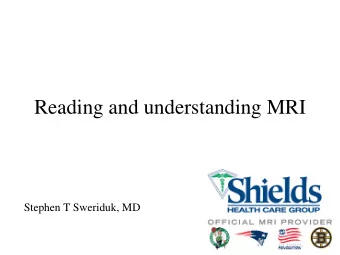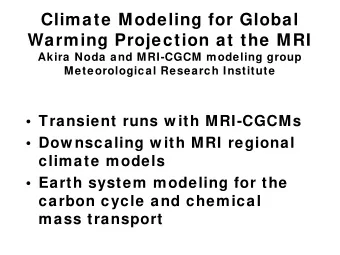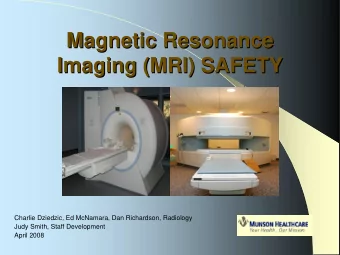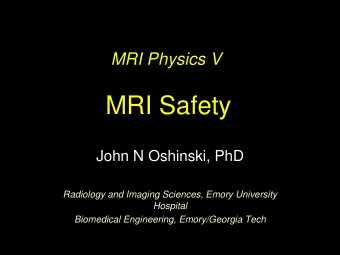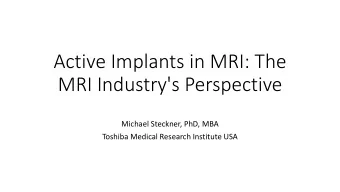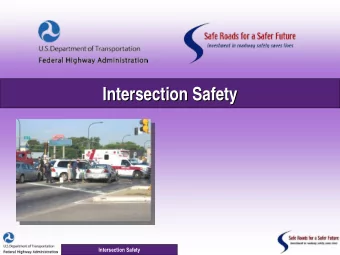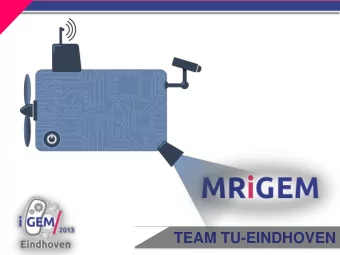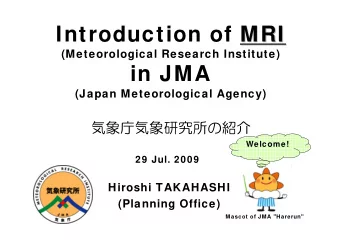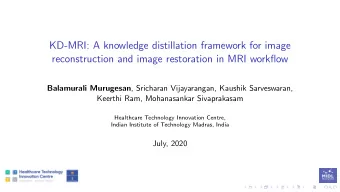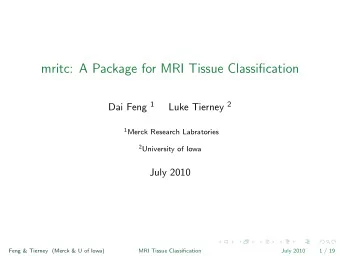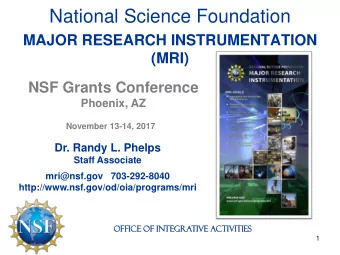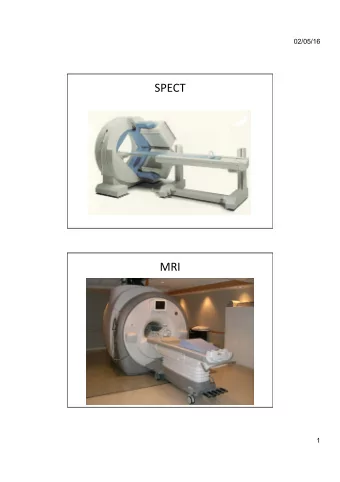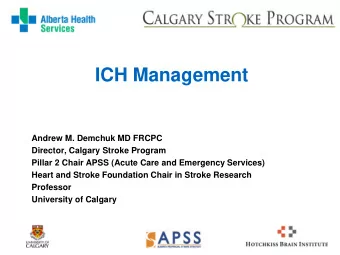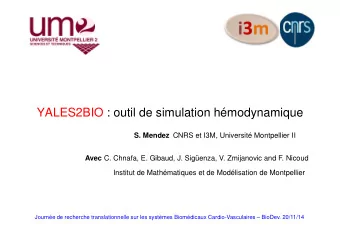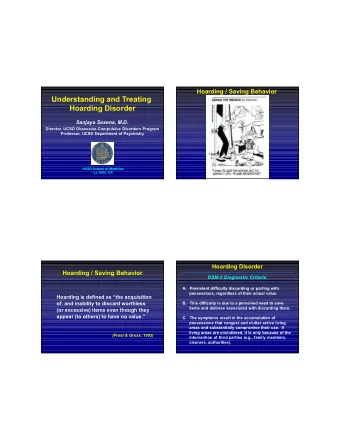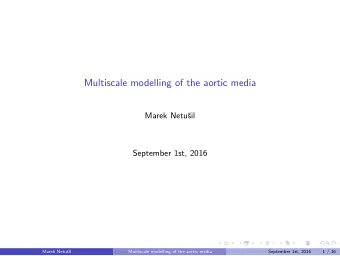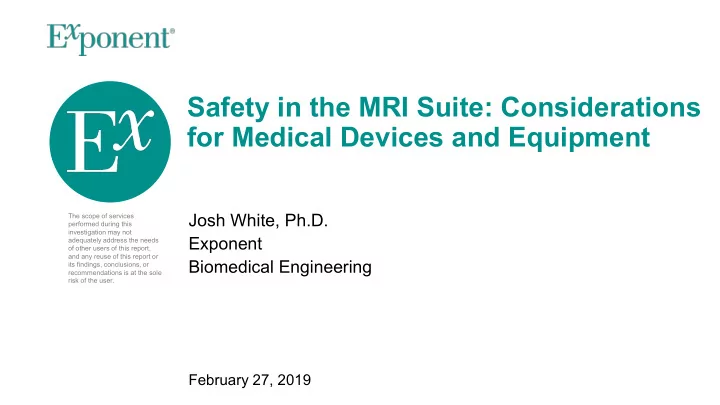
Safety in the MRI Suite: Considerations for Medical Devices and - PowerPoint PPT Presentation
Safety in the MRI Suite: Considerations for Medical Devices and Equipment Josh White, Ph.D. The scope of services performed during this investigation may not Exponent adequately address the needs of other users of this report, and any reuse
Safety in the MRI Suite: Considerations for Medical Devices and Equipment Josh White, Ph.D. The scope of services performed during this investigation may not Exponent adequately address the needs of other users of this report, and any reuse of this report or Biomedical Engineering its findings, conclusions, or recommendations is at the sole risk of the user. February 27, 2019
Importance of MRI Safety FDA MAUDE Database The Guardian 2
Biomedical Engineering Neurovascular Ophthalmology Neurosurgery/Spine Electrophysiology Cardiovascular Vascular Surgery General Surgery Diabetes Orthopaedics Gynecology Urology Peripheral Vascular 3
Biomedical Engineering Neurovascular Ophthalmology Neurosurgery/Spine Electrophysiology Cardiovascular Vascular Surgery General Surgery Diabetes Orthopaedics Gynecology Urology Peripheral Vascular 4
The Interface of MRI with Medical Devices Increasing Number of Patients with Increasing Use of MRI Systems Medical Devices EMRF | TRTF 5
MRI Compatibility Testing Define Evaluate MRI Risks Device Labeling 6
MRI Compatibility Testing Define Evaluate MRI Risks Device Labeling General Application Cryogens of MRI Contrast Agents Device-Specific 7
MRI Basics 8
MRI Basics Ma Magne net: Create strong static magnetic field. Align hydrogen atoms. Direct ection o of ma magnet etic f c fiel eld 9
MRI Basics Ma Magne net: Create strong static magnetic field. Align hydrogen atoms. Ra Radiofreq equen ency cy (RF (RF) ) Coil: Apply electromagnetic wave in pulses that transfers energy to certain hydrogen atoms. 10
MRI Basics Ma Magne net: Create strong static magnetic field. Align hydrogen atoms. Ra Radiofreq equen ency cy (RF (RF) ) Coil: Apply electromagnetic wave in pulses that transfers energy to certain hydrogen atoms. Gradi dient C Coil: : Modify the main magnetic field to allow spatial encoding in the x-, y-, and z-directions. y z x 11
Types of Medical Devices and Equipment Passive Devices Active Devices 12
Types of Medical Devices and Equipment Passive Devices Active Devices • No power source. • Therapy provided by design of medical device, passive release of drug from a drug-eluting stent, etc. MedicalExpo Twin Palm Corin Orthopedics ADAM 13
Types of Medical Devices and Equipment Passive Devices Active Devices • No power source. • Power source. • Therapy provided by design of medical • Often deliver therapy due to device, passive release of drug from a programmed output from the power drug-eluting stent, etc. source. MedicalExpo Twin Palm MDDI CHOC Corin Orthopedics ADAM 14
Device-Related MRI Risks 15
Device-Related MRI Risks Potential Hazard Cause from MRI Scanner RF Field Thermal Heat Gradient Field Vibration Gradient Field Mechanical Force Static Field Torque Static Field RF Field Electrical Unintended Stimulation Gradient Field Static Field RF Field Device Malfunction Functional Gradient Field Combined Fields Image Artifact Combined Fields 16
Device-Related MRI Risks Potential Hazard Cause from MRI Scanner RF Field Thermal Heat Gradient Field Vibration Gradient Field Mechanical Force Static Field Torque Static Field RF Field Electrical Unintended Stimulation Gradient Field Static Field RF Field Device Malfunction Functional Gradient Field Combined Fields Image Artifact Combined Fields 17
Device-Related MRI Risks Potential Hazard Cause from MRI Scanner RF Field Thermal Heat Gradient Field Vibration Gradient Field Mechanical Force Static Field Torque Static Field RF Field Electrical Unintended Stimulation Gradient Field Static Field RF Field Device Malfunction Functional Gradient Field Combined Fields Image Artifact Combined Fields 18
Device-Related MRI Risks Potential Hazard Cause from MRI Scanner RF Field Thermal Heat Gradient Field Vibration Gradient Field Mechanical Force Static Field Torque Static Field RF Field Electrical Unintended Stimulation Gradient Field Static Field RF Field Device Malfunction Functional Gradient Field Combined Fields Image Artifact Combined Fields 19
Device-Related MRI Risks Potential Hazard Cause from MRI Scanner RF Field Thermal Heat Gradient Field Vibration Gradient Field Mechanical Force Static Field Torque Static Field RF Field Electrical Unintended Stimulation Gradient Field Static Field RF Field Device Malfunction Functional Gradient Field Combined Fields Image Artifact Combined Fields 20
Device-Related MRI Risks Potential Hazard Cause from MRI Scanner RF Field Thermal Heat Gradient Field Vibration Gradient Field Mechanical Force Static Field Torque Static Field RF Field Electrical Unintended Stimulation Gradient Field Static Field RF Field Device Malfunction Functional Gradient Field Combined Fields Image Artifact Combined Fields 21
MRI Compatibility Testing Define Evaluate MRI Risks Device Labeling 22
MRI Compatibility Testing Define Evaluate MRI Risks Device Labeling 23
Device-Related MRI Risks Potential Hazard Cause from MRI Scanner International Test Standard ISO 10974:8 RF Field ASTM F2182 Heat Gradient Field ISO 10974:9 Vibration Gradient Field ISO 10974:10 Force Static Field ISO 10974:11 ( ASTM F2052 ) Torque Static Field ISO 10974:12 ( ASTM F2213 ) RF Field ISO 10974:13 Unintended Stimulation Gradient Field ISO 10974:15 Static Field ISO 10974:14 RF Field ISO 10974:15 Device Malfunction Gradient Field ISO 10974:16 Combined Fields ISO 10974:17 Image Artifact Combined Fields ASTM F2119 24
Testing in Accordance with Existing Standards Works 25
Passive and Active Medical Devices Indiamart MDDI Integer ADAM 26
Challenges with Traditional Testing Passive Devices Active Devices • Determination of Worst Case Configurations for Multi-Configuration Devices. 27
Challenges with Traditional Testing Passive Devices Active Devices • Determination of Worst Case • More complex devices. Configurations for Multi-Configuration • Determination of worst case Devices. configurations. • Measurement of transfer function. • Validated simulation environment. • Utilization of human body modeling. 28
Testing in Accordance with Existing Standards Has Limitations 29
Gaps in Standards 30
Gaps in Standards Passive Devices Active Devices • ASTM F2182 • ISO 10974 • ASTM F2119 • ASTM F2182 • ASTM F2052 • ASTM F2119 • ASTM F2213 • ASTM F2052 • ASTM F2213 31
Gaps in Standards 32
Gaps in Standards ISO SO 10974 10974 AST STM F F2182 2182 AST STM F F2182 2182 AST STM F F2119 2119 AST STM F F2119 2119 AST STM F F2052 2052 AST STM F F2052 2052 AST STM F F2213 2213 AST STM F F2213 2213 33
Gaps in Standards ISO SO 10974 10974 AST STM F F2182 2182 AST STM F F2182 2182 AST STM F F2119 2119 AST STM F F2119 2119 AST STM F F2052 2052 AST STM F F2052 2052 AST STM F F2213 2213 AST STM F F2213 2213 34
Breast Tissue Marker • Potential Hazards • Displacement • Torque • RF Heating • Artifact • Tests • Defined by standards LEICA 35
Breast Tissue Marker Schematic of displacement test setup. Magnified view of the displacement test setup. Conclusion from testing : marker fails test for displacement. 36
Breast Tissue Marker Win Wind Magnet etic c Fo Forc rce Weight ght Weight ght Example of a windsock. Schematic of displacement test setup. 37
Ventilator • Potential Hazards • Displacement • Malfunction • Tests • No exact standards exist to guide testing. 38
Ventilator Differ eren ent ma magnet etic f c fiel eld strengths hs MRI Scanner 39
Ventilator Differ eren ent ma magnet etic f c fiel eld strengths hs MRI Scanner Differ eren ent t tes est locations loc 40
Peripheral stent • Potential Hazards • Displacement • Torque • RF Heating • Artifact • Tests • Defined by standards 41
Peripheral stent Schematic of the electric fields in a phantom used for testing, as well as an example of a simulated ANSYS human body model with its corresponding electric field distribution. Limitations : Limited test setup, positioning, long metallic devices 42
Peripheral stent Schematic of a human body model in a simulated RF coil, as well as the corresponding electric fields in the human body during the MRI. 43
Peripheral stent RF-Induced Temperature Rise 20 Temperature (°C) 15 10 5 0 0 3 6 9 12 15 Time (min) Benchtop Simulated Flow Conditions Hypothetical temperature rise measured from a stent during MRI testing, as well as when computational modeling is performed to incorporate fluid flow. A temperature distribution around the stent is also shown. 44
Peripheral stent Define Evaluate MRI Risks Device Labeling Computational Benchtop Human Body Fluid Testing Modeling Dynamics 45
Neurovascular Embolization Coil • Potential Hazards • Displacement • Torque • RF Heating • Artifact • Tests • Defined by standards Cook Medical Aneurysm Coil Vessel 46
Recommend
More recommend
Explore More Topics
Stay informed with curated content and fresh updates.


